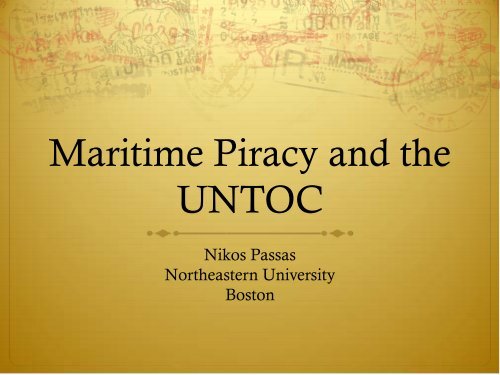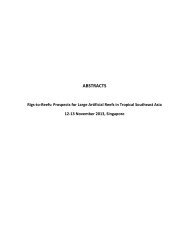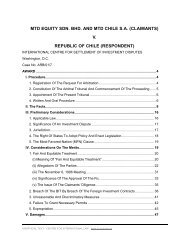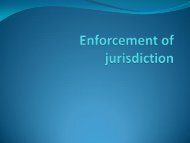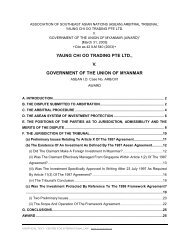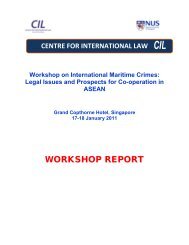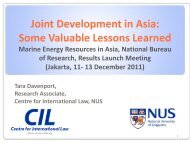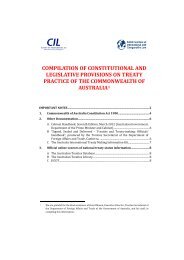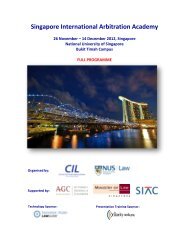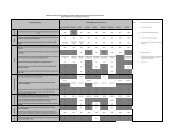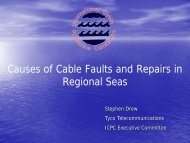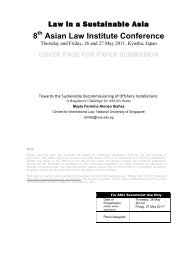Maritime Piracy and UNTOC - Centre for International Law
Maritime Piracy and UNTOC - Centre for International Law
Maritime Piracy and UNTOC - Centre for International Law
You also want an ePaper? Increase the reach of your titles
YUMPU automatically turns print PDFs into web optimized ePapers that Google loves.
<strong>Maritime</strong> <strong>Piracy</strong> <strong>and</strong> the<br />
<strong>UNTOC</strong><br />
Nikos Passas<br />
Northeastern University<br />
Boston
Among Causes of <strong>Piracy</strong><br />
Opportunity emphasized most often<br />
Geography<br />
Legal/institutional weaknesses, incl. cultural acceptability<br />
Important to strengthen legal system
Different types of piracy<br />
Low-level armed robbery<br />
Medium-level armed assault <strong>and</strong> robbery<br />
Major hijacking<br />
Source: IMO, 1993<br />
Parasitic<br />
Episodic<br />
Intrinsic<br />
Source: Anderson, 1995
position of state managers in the course of piracy,<br />
ideology,<br />
continuity of piracy<br />
Source: Hua-Lun Huang, 2010
Applicable Texts<br />
The UN <strong>Law</strong> of the Sea Convention 1982<br />
The Geneva High Seas Convention 1958 [still relevant <strong>for</strong> States not<br />
party to UNCLOS]<br />
The Convention <strong>for</strong> the Suppression of Unlawful Acts Against the<br />
Safety of <strong>Maritime</strong> Navigation 1988 <strong>and</strong> its Protocols<br />
The <strong>International</strong> Convention Against the Taking of Hostages 1979<br />
<strong>UNTOC</strong> 2000<br />
UN Convention against Corruption 2003<br />
UN Convention <strong>for</strong> the Suppression of the Financing of Terrorism<br />
1999<br />
UN Security Council Resolutions 1814 (2008), 1816 (2008), 1838<br />
(2008), 1844 (2008), 1846 (2008), 1851 (2008), 1897 (2009) 1918 (2010)
Creative Treatment of<br />
Serious Crime Problems<br />
Assets <strong>and</strong> taxes<br />
Money laundering<br />
Organized crime <strong>UNTOC</strong><br />
Terrorism finance<br />
Corruption (UNCAC)<br />
Human rights
UNCLOS does not provide <strong>for</strong> investigatory or<br />
prosecutorial procedures or guidelines <strong>for</strong> international<br />
cooperation in these undertakings,<br />
piracy can be defined as a serious crime under <strong>UNTOC</strong>,<br />
providing int’l cooperation <strong>and</strong> MLA tools<br />
UNCAC offers additional ones<br />
<strong>Piracy</strong>: act of terrorism or act financing terrorism
<strong>UNTOC</strong> applicability
Four Main Offences<br />
Participation in an organized criminal group (Art. 5)<br />
Laundering of proceeds of crime (Art. 6)<br />
Corruption (Art. 8)<br />
Obstruction of justice (Art. 23)<br />
Transnationality <strong>and</strong> involvement in an organized criminal group need/should not<br />
be elements of offences in domestic law (Art. 34. 2).
These are potentially<br />
applicable<br />
If piracy is a “serious crime” under national law <strong>and</strong><br />
Is committed by those participating in an organized<br />
criminal group<br />
pirates launder the proceeds of their crime<br />
pirates bribe or offer/attempt to bribe officials<br />
they obstruct justice
OC group participation<br />
agreeing to commit a serious crime <strong>for</strong> financial or<br />
material benefit<br />
or<br />
knowingly taking part in criminal or related activities<br />
of an organized criminal group to contribute to criminal<br />
aim<br />
different approaches to conspiracy, association etc. possible. States<br />
must see that domestic law covers all serious crimes committed by<br />
organized groups
Organized criminal group<br />
structured group<br />
of three or more persons<br />
Art. 2<br />
existing <strong>for</strong> a period of time<br />
acting in concert<br />
aim of committing:<br />
serious crimes or <strong>UNTOC</strong> offences<br />
to obtain direct or indirect financial or other material<br />
benefit (Art. 2. a)
Structured group (Art. 2 c)<br />
Not necessarily <strong>for</strong>mal organization, membership or<br />
structure, but<br />
more than just “…r<strong>and</strong>omly <strong>for</strong>med <strong>for</strong> the immediate<br />
commission of an offence”
Money Laundering (art. 6)<br />
Conversion or transfer to conceal criminal origins<br />
Concealment of nature, source, location, disposition,<br />
movement or ownership<br />
Knowing acquisition of proceeds*<br />
Participation, association, conspiracy, attempts, aiding,<br />
abetting <strong>and</strong> facilitating*<br />
*to the extent these are compatible with the fundamental<br />
legal principles of States Parties
M<strong>and</strong>atory<br />
Corruption (art. 8)<br />
promise, offer, give, solicit or accept<br />
any undue advantage to/by a public official<br />
to act or refrain from acting<br />
any matter relating to official’s public duties<br />
participation as an accomplice<br />
Optional<br />
Bribe <strong>for</strong>eign or international public servants<br />
Other <strong>for</strong>ms of corruption (abuse of power, abuse of function,<br />
illicit enrichment, etc.)
Obstruction of Justice (art. 23)<br />
Using <strong>for</strong>ce, threats or intimidation or<br />
promising, offering or giving undue advantage<br />
to interfere with giving of evidence or testimony<br />
to interfere with exercise of duties of judicial or lawen<strong>for</strong>cement<br />
official<br />
in connection with proceedings on any Convention<br />
offence
In addition, <strong>UNTOC</strong> covers<br />
Transnational offences<br />
That constitute serious crimes<br />
Committed by organized criminal group
Transnationality (Art. 3.2)<br />
It is committed in more than one State<br />
It is committed in one State but a substantial part of its<br />
preparation, planning, direction or control takes place in<br />
another State<br />
It is committed in one State but involves an organized<br />
criminal group that engages in criminal activities in more than<br />
one State; or<br />
It is committed in one State, but has substantial effects in<br />
another State
Even wider scope<br />
article 16 (extradition): the person who is the subject of<br />
the request <strong>for</strong> extradition is located in the territory of<br />
the requested State party<br />
article 18 (mutual legal assistance): victims, witnesses,<br />
proceeds, instrumentalities or evidence of offences are<br />
located in the requested State party
Serious crime (Art. 2b)<br />
Conduct constituting an offence punishable by a<br />
maximum deprivation of liberty of at least four years or<br />
a more serious penalty
Organized Criminal Group<br />
(art. 2a)<br />
A structured group of three or more persons existing <strong>for</strong><br />
a period of time<br />
Acting in concert with the aim of committing one or<br />
more serious crimes or offences established in<br />
accordance with the Convention<br />
to obtain, directly or indirectly, a financial or other<br />
material benefit
Helpful provisions<br />
Seizure <strong>and</strong> Confiscation of proceeds<br />
<strong>International</strong> cooperation<br />
Extradition<br />
Mutual legal assistance<br />
Special investigative techniques<br />
Joint investigations<br />
Training <strong>and</strong> technical assistance
<strong>International</strong> cooperation<br />
Extradition (Art. 16)<br />
Mutual Legal Assistance (Art. 18)<br />
Investigative measures <strong>and</strong> other <strong>for</strong>ms of cooperation<br />
(Art. 20, 26, 27)
Extradition<br />
Extradition available <strong>for</strong> all Convention offences<br />
Convention extradition provisions harmonize with existing<br />
treaties <strong>and</strong> arrangements<br />
No refusal on the sole ground of fiscal matters<br />
Limitations in domestic law <strong>and</strong> existing treaties apply<br />
Parties must either “Extradite or Prosecute” own nationals<br />
Be<strong>for</strong>e refusing an extradition request, the States involved<br />
should consult
MLA<br />
“States Parties shall af<strong>for</strong>d one another the widest measure of<br />
mutual legal assistance…” (Art. 18. 1)<br />
Most requirements are operational, not legislative, but Parties must<br />
have legal powers needed to produce <strong>and</strong> deliver assistance<br />
States Parties are required to designate a central authority to receive,<br />
execute or transmit legal assistance requests<br />
No right to refuse MLA on the ground of bank secrecy<br />
More direct liaison arrangements permitted <strong>for</strong> other <strong>for</strong>ms of<br />
cooperation<br />
(Art. 18. 13, Art. 19, 27)
Investigative measures<br />
agreements on joint investigations (Art. 19)<br />
domestic <strong>and</strong> cooperative use of special investigative techniques<br />
(Art. 20):<br />
controlled delivery<br />
electronic or other <strong>for</strong>ms of surveillance<br />
undercover operation<br />
measures to encourage those involved in transnational organized crime<br />
to cooperate with law en<strong>for</strong>cement authorities (Art.26)
Other <strong>for</strong>ms of cooperation<br />
(art. 27)<br />
Establish <strong>and</strong> enhance channels of communication<br />
cooperate in inquiries concerning the identity,<br />
whereabouts <strong>and</strong> activities of suspects; the movement of<br />
proceeds of crime or instrumentalities<br />
exchange in<strong>for</strong>mation on:<br />
specific means <strong>and</strong> methods used by organized<br />
criminal groups<br />
general trends, analytical techniques, definitions,<br />
st<strong>and</strong>ards <strong>and</strong> methodologies
Issues<br />
Must cross borders – domestic offences with domestic effects<br />
by local group are not transnational<br />
Low-level offences may not constitute ‘serious crime’<br />
If one or two persons commit the offence, it is not committed<br />
by an organized criminal group<br />
States must criminalize the act of piracy <strong>and</strong> contribute to the<br />
prosecution of suspected pirates (esp. their own nationals)<br />
Wider awareness <strong>and</strong> preparedness to use the <strong>UNTOC</strong> (or<br />
UNCAC, when appropriate) against maritime piracy
Challenges in <strong>UNTOC</strong><br />
implementation<br />
Complexity of instrument (multiple agencies/depts)<br />
Capacity<br />
Political will – not always seen as a top priority<br />
Quality of technical assistance received<br />
Coordination of various implementation <strong>and</strong> technical<br />
assistance initiatives<br />
Regulatory tsunami – too many instruments to be<br />
implemented by governments at the same time (terrorism,<br />
<strong>UNTOC</strong>, UNCAC, etc.)
Dual criminality<br />
MLA<br />
UNCAC<br />
Implementation momentum<br />
Resources<br />
Synergies
TA needs identified by<br />
states
Legal Assistance Needs
UN <strong>International</strong> Convention<br />
<strong>for</strong> the Suppression of the<br />
Financing of Terrorism
Art. 2<br />
someone commits the offense of terrorist financing if s/he<br />
“by any means, directly or indirectly, unlawfully <strong>and</strong> willfully,<br />
provides or collects funds with the intention that they should<br />
be used or in the knowledge that they are to be used, in full or<br />
in part, in order to carry out a) an act which constitutes an<br />
offence within the scope of <strong>and</strong> as defined in one of the<br />
treaties listed in the annex” [nine universal instruments<br />
against terrorism] or<br />
b) any act “intended to cause death or serious bodily injury to<br />
a civilian, or to any other person not taking an active part in<br />
the hostilities in a situation of armed conflict, when the<br />
purpose of such act, by its nature or context, is to intimidate a<br />
population, or to compel a government or an international<br />
organization to do or to abstain from doing any act”
UNSCR 1373 2001<br />
1. Decides that all States shall:<br />
(a) Prevent <strong>and</strong> suppress the financing of terrorist acts;<br />
(b) Criminalize the wilful provision or collection, by any means, directly<br />
or ndirectly, of funds by their nationals or in their territories with the<br />
intention that the funds should be used, or in the knowledge that they<br />
are to be used, in order to carry out terrorist acts;<br />
(c) Freeze without delay funds <strong>and</strong> other financial assets or economic<br />
resources of persons who commit, or attempt to commit, terrorist acts<br />
or participate in or facilitate the commission of terrorist acts; of entities<br />
owned or controlled directly or indirectly by such persons; <strong>and</strong> of<br />
persons <strong>and</strong> entities acting on behalf of, or at the direction of such<br />
persons <strong>and</strong> entities, including funds derived or generated from property<br />
owned or controlled directly or indirectly by such persons <strong>and</strong><br />
associated persons <strong>and</strong> entities;
Autonomous obligation<br />
(d) Prohibit their nationals or any persons <strong>and</strong> entities<br />
within their territories from making any funds, financial<br />
assets or economic resources or financial or other related<br />
services available, directly or indirectly, <strong>for</strong> the benefit of<br />
persons who commit or attempt to commit or facilitate<br />
or participate in the commission of terrorist acts, of<br />
entities owned or controlled, directly or indirectly, by<br />
such persons <strong>and</strong> of persons <strong>and</strong> entities acting on behalf<br />
of or at the direction of such persons;
Thank you so much<br />
n.passas@neu.edu<br />
npassas@gmail.com


